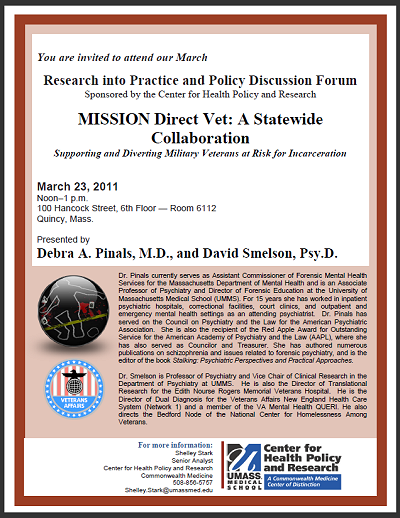 |
Debra A. Pinals, MD, associate professor of psychiatry and director of forensic education, and David Smelson, PsyD, professor of psychiatry and vice chair of clinical research in the Department of Psychiatry, will present, “Mission Direct Vet: A Statewide Collaboration,” at the next Research into Practice and Policy Discussion Forum on Wednesday, March 23, in Quincy, Mass.
Mission-Direct Vet, which stands for Maintaining Independence and Sobriety through Systems Integration, Outreach and Networking-Diversion and Recovery for Traumatized Veterans, is a court-based jail diversion program designed to assist veterans who are at increased risk of incarceration due to mental health conditions that occur together, such as post traumatic stress disorder and substance use. The program was developed by the Massachusetts Department of Mental Health Services, in partnership with investigators at UMass Medical School and the Veterans Administration, and is funded through a grant from the Substance Abuse and Mental Health Services Administration (SAMHSA).
Dr. Pinals, who is the principal investigator on the SAMHSA grant, is also assistant commissioner of forensic mental health services at the Massachusetts Department of Mental Health. She has worked in inpatient psychiatric hospitals, correctional facilities, court clinics, and outpatient and emergency mental health settings as an attending psychiatrist. Pinals has served on the Council on Psychiatry and the Law for the American Psychiatric Service for the American Academy of Psychiatry and the Law (AAPL), where she has also served as councilor and treasurer.
Dr. Smelson, who is co-principal investigator on the SAMHSA grant, holds several director positions, including director of translational research for the Edith Nourse Rogers Memorial Veterans Hospital and director of dual diagnosis for the Veterans Affairs New England Health
Care System (Network 1). He is also a member of the Veterans Affairs Mental Health Quality Enhancement Research Initiative, a national research program funded by the Health Services Research and Development Service of the Department of Veterans Affairs.
The forum will be held at 100 Hancock Street in Quincy, Mass. from noon to 1 p.m. UMass Medical School faculty and staff interested in attending should contact CHPR Senior Analyst Shelley Stark by phone at 508-856-5757 or via e-mail at shelley.stark@umassmed.edu.
About the Research into Practice and Policy Discussion Forum
The Research into Practice and Policy Discussion Forum was established by Commonwealth Medicine’s (CWM) Center for Health Policy and Research in 2008 to provide policy practitioners at the Massachusetts Office of Health and Human Services and CWM with access to cutting-edge clinical and health policy research conducted at UMass Medical School. Previous topics include therapies to address macular degeneration, advanced quality improvement processes to advance cardiovascular health service delivery, and analysis of the impact of Buprenorphine on addictions treatment, among others. Past speakers include Darshak Sangavi, MD, PhD, assistant professor of pediatrics; Robert Phillips, MD, professor of medicine and director of the Heart and Vascular Center of Excellence at UMass Memorial Health Care; and Gary Stein, PhD, the Gerald L. Haidak, MD, and Zelda S. Haidak Professor of Cell Biology and chair and professor of cell biology. For an overview of their presentations and others that took place in 2010, visithttp://inside.umassmed.edu/ComMed/chpr/Forums_2010.aspx.
About the Center for Health Policy and Research
UMass Medical School’s Center for Health Policy and Research works with public sector agencies and other non-profit and managed care organizations to translate research evidence into change, both in practice and policy. Its goals include development and implementation of clinical best practices; measurement of the impact and effectiveness of policies and programs; evaluation of cost-effectiveness and compliance with guidelines within populations and health plan
membership; and education of health practitioners and the broader public about best practices. For more information visit www.umassmed.edu/chpr
About Commonwealth Medicine
Commonwealth Medicine (CWM) is the public, nonprofit health care consulting and service organization founded by UMass Medical School. Government agencies, nonprofits and managed care organizations benefit from CWM’s expertise in clinical service delivery, health care financing strategies, policy management and quality improvement. CWM programs have helped Massachusetts—and many other state, international and local health care agencies—to increase the value of health care expenditures while improving access and delivery of care to at-risk and uninsured populations. Commonwealth Medicine programs were developed, in part, as a way for UMMS faculty and staff to have a direct and profound impact on the communities of Massachusetts, and now provide critical opportunities for UMMS faculty and students to serve the community. For more information visitwww.umassmed.edu/commed.